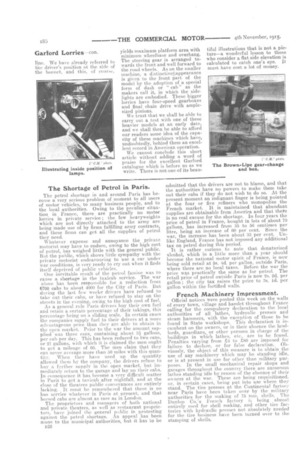The Shortage of Petrol in Paris.
Page 6

If you've noticed an error in this article please click here to report it so we can fix it.
The petrol shortage in and around Paris has become a very serious problem of moment to all users of motor vehicles, to many business people, and to the local authorities. Owing to the peculiar situation in France, there are practically no motor lorries in private service ; the few heavyweights which are not directly attached to the army are being made use of by firms fulfilling army contracts, and these firms can get all the supplies of petrol they need. Whatever expense and annoyance the private motorist may have to endure, owing to the high cost of petrol, has weighed little with the general public. But the public, which shows little sympathy with the private motorist endeavouring to use a car under war conditions, is very ready to cry out when it finds itself deprived of public vehicles.
One inevitable result of the petrol famine was to cause a shortage in the taxicab service. The war alone has been responsible for a reduction from 6700 cabs to about 4000 for the City of Paris. But during the last few weeks drivers have refused to take out their cabs, or have refused to stay on the streets in the evening, owing to the high cost of fuel.
As a general rule Paris drivers buy their own fuel and retain a certain percentage of their takings, this percentage being on a sliding scale. In certain cases the companies supply fuel to their drivers at a more advantageous mice than they are able to obtain in the open market. Prior to the war the amount supplied was three cans, containing about 3A.gallons, per cab per day. This has been reduced to two cans, or 2:!: gallons, with which it is claimed the men ought to get a mileage of 60. The then claim that they can never average more than 50 miles with this quantity. When they have used lip the quantity allowed them by the company, the drivers refuse to buy a further supply in the open market, but immediately return to the garage and lay up their cabs. In consequence it has become a very difficult matter in Paris to get a tayicab after nightfall, and at the close of the theatres public conveyances are entirely lacking. It must be remembered that there is no bus service whatever in Paris at present, and that horsed cabs are almost as rare as in London.
The proprietors and managers of both national and private theatres, as well as restaurant proprie
tors., have joined the general public in protesting against the petrol shortage. An appeal has been alarm to the municipal authorities, but it has io be B26 admitted that the drivers are not to blame, and that the authorities have no powers to make them take out their cabs if they do not wish to do so. At the present moment an indignant finger is being pointed at the four or five refiners who monopolize the French market.It is maintained that abundant supplies are obtainable from America and that thete is no real excuse for the shortage. In four years the price of petrol in France, bought in lots of about 70 gallons, has increased from 35 to 56 centimes per litre, being an increase of 60 per cent. Since the war, the increase has been about 33 per cent. Unlike England, France has not imposed any additional tax on petrol during this period. It is rather curious to note that denaturized alcohol, which in a little more than a year should become the national motor spirit of France, is now being sold retail at 5s. 4d. per gallon, outside Paris, where there are no local taxes. Before the war the price was practically the same as for petrol. The retail price of petrol outside Paris is now 2s. 2d. per gallon ; the city tax raises the price to 3s. id. per gallon within the fortified walls.
French Machinery Impressment.
Official notices were posted this week on the walls of every town, village and hamlet throughout France calling for the compulsory declaration to the local authorities of all lathes, hydraulic presses and steam hammers, with the exception of those to be found in State workshops. This declaration is incumbent on the owners, or in their absence the landlords, guardians, or other persons in charge of the buildings in which lathes, etc., are to be feund. Penalties varying from £4 to £80 are imposed for failure to declare, or for false declaration. Obviously, the object of this measure is to obtain the use of any machinery which may be standing idle, or is at present in use for other than military purposes. In the small mechanical repair shops and garages throughout the country there are numerous lathes standing idle by reason of the absence of their owners at the war. These are being requisitioned, or, in certain cases, being put. into use where they stand, The tire presses at the Continental factory near Paris have been taken over by the military authorities for the making of 75 nun. shells, The Dunlop Co.'s French factory is being almost entirely used for shell making, and other tire factories with hydraulic presses net absolutely needed for the tire business have been turned over to the stamping of shells.




















